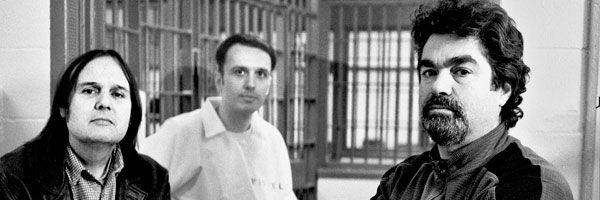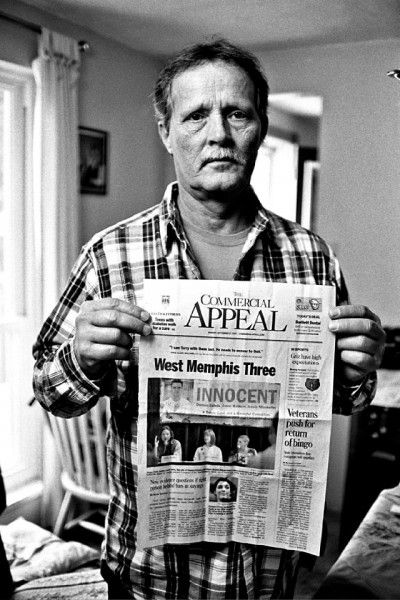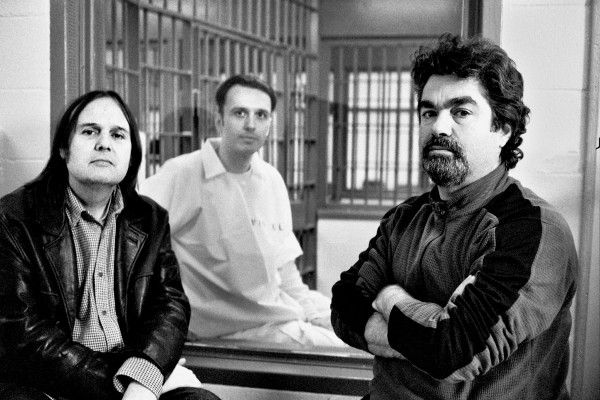Paradise Lost 3: Purgatory is a tricky movie to review. Documentary filmmakers Joe Berlinger and Bruce Sinofsky have been following the unjust arrest and conviction of the West Memphis Three since the initial high profile trial and their films have undeniably played a major role in the three men’s release from prison in August (after spending half of their lives behind bars for a crime they didn’t commit). This third film in the series brings everything up to date with one rather big exception: the sudden release occurred three days after Berlinger and Sinofsky completed work on their film. Apparently the directors are already working on a coda that will be added to the film for the New York Film Festival and fall release, so the version of the movie screening at the Toronto Film Festival is incomplete. It might not be time to judge the movie entirely just yet, but what exists at the moment is certainly a compelling continuation of the disturbing ongoing saga. Hit the jump for more.
Picking up ten years after the last film, Paradise Lost 3: Purgatory is designed so that it can be seen without the previous two movies under your belt. The fist half hour is almost entirely dedicated to bringing the audience up to speed. For the unfamiliar, the West Memphis Three are Damien Echols, Jason Baldwin, and Jessie Misskelley. In 1993 they were arrested as teenagers for the murder of three children whose mangled bodies were found in the woods in West Memphis Arkansas. The bodies were so mutilated that unprepared authorities assumed that the murders must have been ritualistic and performed by Satanists (the type of delightful thinking that only comes from particularly enlightened areas of the south). The three teens were convicted on circumstantial evidence and targeted almost entirely because they were outsiders who dressed in black and listened to heavy metal.
The first Paradise Lost film follows their trial in terrifying detail. It’s clear something is deeply wrong, from a false confession given by Jessie Misskelley after the teenager with a mild mental handicap was subjected to 12 hours of unrecorded police interrogation; to the state’s “expert†witness on the occult who only had a mail order degree in the subject. Baldwin and Misskelley were given life sentences without parole and Damien was sentenced to death. They’ve languished in prison since 1994, but Berlinger and Sinofsky’s powerful documentary got the three unjustly convicted teens international attention. In the ensuing years a huge support network has evolved, organizing countless petitions and demonstrations. High profile figures have come out in support of the cause including Peter Jackson who has been paying for their legal fees for years.
The new film picks up around this point in the story and as the subtitle Purgatory suggests, it’s about the perpetual state of limbo the West Memphis Three have now spent half of their lives in. Almost everyone who knows about the case thinks they are innocent, yet in prison the sit as the years pass. New interviews in the film are dated from 2005-2011, with the filmmakers slowly compiling the latest project over several years, hoping for some sort of appeal or release that ironically only came once the film was complete. There are plenty of interesting revelations including a new suspect in one of the murdered boys’ father (who has no alibi for the night of the murders and DNA evidence discovered on the bodies) and a surprising update from previous prime suspect John Mark Byers who now believes that Echols and co are innocent despite the terrifyingly angry hatred of the teens that he spewed out in the first films. However, the main subject of the new movie is how the bureaucracy and glacial pace of the court system has prevented any action from being taken despite the 17 years of public outcry.
In fact, the movie (and the entire series for that matter) presents such a damning portrayal of the court system that you have to wonder if it’s a coincidence that the West Memphis Three were suddenly released mere weeks before the film’s premiere. The whole thing is very odd, with Echols, Baldwin, and Misskelley let out only after pleading guilty to the murders. It’s nice that they’re free and in particular that Echols was never killed by the state, but the nature of their release prevents them from ever suing over the false conviction and being compensated for the years of their lives lost. It’s unclear how much of this will be included in Paradise Lost 3’s eventual coda, but it’s obviously something that simply must be a part of the film.
Even in this incomplete form, Paradise Lost 3 is a powerful and disturbing documentary. It’s been presented in such a way that requires no prior knowledge of the case or films. That’s guaranteed to attract new viewers, but might frustrate longtime supporters ever so slightly because the first half hour of the film is basically all recap. Still, this is vital viewing and collectively the Paradise Lost movies represent a remarkable achievement in documentary filmmaking. It’s rare that any film make a tangible impact on the real world, but as Echols himself says in the movie, without these documentaries he would have been dead and forgotten long ago. I’ll be curious to see how the film plays once the new material is added and hopefully HBO’s planned theatrical release this fall will expand the audience for these movies. The Paradise Lost series is an incredible long-term documentary achievement and a story that needed to be told.
--- A-
For all of our coverage of the 2011 Toronto International Film Festival, click here. Also, here are links to all of my TIFF 2011 reviews so far:



